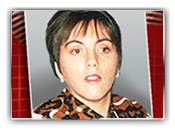Heart of Schiavo fight: Humans decide death
BY HOWARD MINTZ, Knight Ridder Newspapers, March 27, 2005
SAN JOSE, Calif. (USA) -- When Terri Schiavo draws her last breath, there will be no agreement on whether she died a compassionate, natural death or whether the withdrawal of medical treatment was an immoral act of starvation.

<< Terri Schiavo
The lack of a middle ground in the ethical debate over Schiavo's fate has riven bioethics experts and religious figures, who have tried to sort through the emotional - and often political - rhetoric to provide guidance for families forced to make life-and-death decisions.
"I think what this case underscores is how complicated dying has become in this country," said Margaret McLean, director of biotechnology and health care ethics at Santa Clara University's Markkula Center for Applied Ethics and head of O'Connor Hospital's ethics center. "You don't have the kind of drifting off in your sleep anymore. Most deaths come from actual decisions people need to make."
Those decisions are complicated by a swirl of medical, religious and legal tensions surrounding the already complex question of when a human life should be saved - and whose ethical compass should control the decision. The issue divides many religions.
In Judaism, it ranges from finding it proper to withdraw medical treatment from someone in a permanent vegetative state to a more Orthodox view of condemning the act as immoral.
"We have to give food and drink if a person is alive," said Rabbi Pinchas Lipner, Orthodox dean of the Institute for Jewish Medical Ethics at Hebrew Academy of San Francisco. "The Jewish position is that we have to care for life."
The Roman Catholic Church has likewise sent conflicting messages. Pope John Paul II last year sent shock waves through Catholic hospitals when he declared that patients in a persistent vegetative state should not be denied food and water, even though those hospitals had for years been following the wishes of families to remove artificial life support when desired.
Cindy Safe, executive director of the Coalition for End of Life Care in Silicon Valley, said her group works with the chaplain at O'Connor Hospital to counsel families on the need to make informed decisions about life-sustaining health care. She added that particularly in the diverse valley, navigating religious beliefs "is the most difficult part of doing this job."
"This is the thing they wrestle with the most," Safe said. "If I'm Catholic, do I do it this way? If I'm Muslim, do I do it that way? It's hard to bring up. We know more about Britney Spears than we do about end-of-life care."
Bioethics experts say that lost in the tumult of the Schiavo case has been the simple coda that medical treatment is very much a matter of personal choice - from deciding whether to forgo a recommended antibiotic to the ultimate choice of withdrawing feeding tubes or hydration.
"Patients have a right to control what we do to their bodies," said David Magnus, co-director of the Stanford Center for Biomedical Ethics. "Our system doesn't say we should do what the Catholic Church believes or what Judaism believes or what Jehovah's Witnesses believe. We're allowed to make our own decisions."
In recent years, local bioethics experts have begun to explore how different cultures deal with end-of-life decisions and modern medicine. Four years ago, Santa Clara's McLean studied the views of 66 South Bay Latinos on life-sustaining medical treatment, finding that while many of their attitudes were common, they encountered communication barriers with the medical profession.
"In this area, there is increasing sensitivity to cultural considerations in the various populations and their dealings with the Western health care system," McLean said.
The Rev. Dean Koyoma, the minister at the Mountain View Buddhist Temple, said his faith keeps a simple approach to the issue in Schiavo case.
"There isn't a hard-and-fast rule in Buddhism," Koyoma said of a decision to withdraw life support. "What it would say is that you have to be mindful of your actions. I don't think these modern technological issues are forcing Buddhism to alter its basic understandings and teachings."


